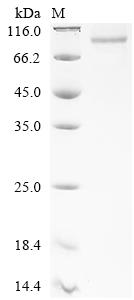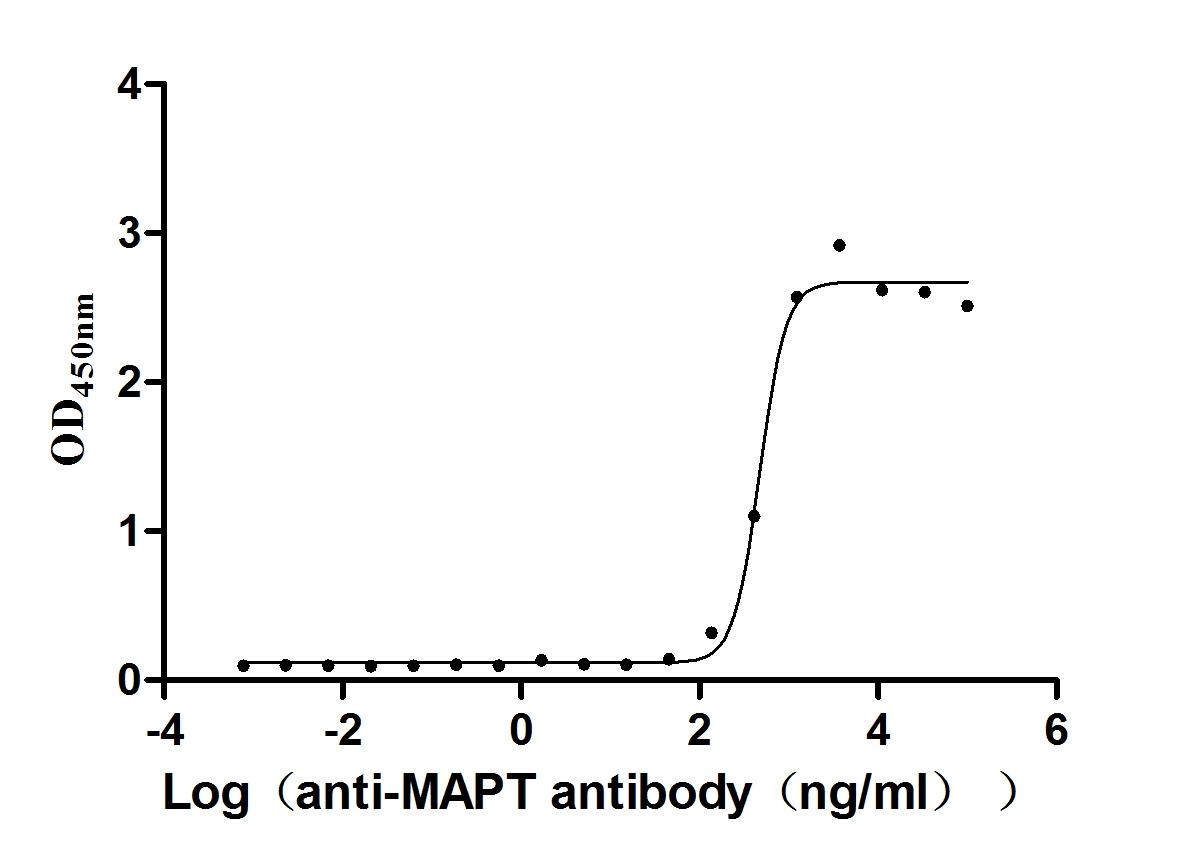Recombinant Human Butyrophilin-like protein 2 (BTNL2), partial
-
中文名稱:Recombinant Human Butyrophilin-like protein 2 (BTNL2), partial
-
貨號(hào):CSB-MP883443HUj8
-
規(guī)格:¥1908
-
圖片:
-
其他:
產(chǎn)品詳情
-
純度:Greater than 85% as determined by SDS-PAGE.
-
生物活性:Not Test
-
基因名:BTNL2
-
Uniprot No.:
-
別名:BTL-II
-
種屬:Homo sapiens (Human)
-
蛋白長(zhǎng)度:Partial
-
來源:Mammalian cell
-
分子量:77.6 kDa
-
表達(dá)區(qū)域:24-455aa
-
氨基酸序列KQSEDFRVIGPAHPILAGVGEDALLTCQLLPKRTTMHVEVRWYRSEPSTPVFVHRDGVEVTEMQMEEYRGWVEWIENGIAKGNVALKIHNIQPSDNGQYWCHFQDGNYCGETSLLLKVAGLGSAPSIHMEGPGESGVQLVCTARGWFPEPQVYWEDIRGEKLLAVSEHRIQDKDGLFYAEATLVVRNASAESVSCLVHNPVLTEEKGSVISLPEKLQTELASLKVNGPSQPILVRVGEDIQLTCYLSPKANAQSMEVRWDRSHRYPAVHVYMDGDHVAGEQMAEYRGRTVLVSDAIDEGRLTLQILSARPSDDGQYRCLFEKDDVYQEASLDLKVVSLGSSPLITVEGQEDGEMQPMCSSDGWFPQPHVPWRDMEGKTIPSSSQALTQGSHGLFHVQTLLRVTNISAVDVTCSISIPFLGEEKIATFSLSGW
Note: The complete sequence including tag sequence, target protein sequence and linker sequence could be provided upon request. -
蛋白標(biāo)簽:C-terminal hFc-Avi-tagged
-
產(chǎn)品提供形式:Liquid or Lyophilized powder
Note: We will preferentially ship the format that we have in stock, however, if you have any special requirement for the format, please remark your requirement when placing the order, we will prepare according to your demand. -
緩沖液:If the delivery form is liquid, the default storage buffer is Tris/PBS-based buffer, 5%-50% glycerol. If the delivery form is lyophilized powder, the buffer before lyophilization is Tris/PBS-based buffer, 6% Trehalose, pH 8.0.
-
復(fù)溶:We recommend that this vial be briefly centrifuged prior to opening to bring the contents to the bottom. Please reconstitute protein in deionized sterile water to a concentration of 0.1-1.0 mg/mL.We recommend to add 5-50% of glycerol (final concentration) and aliquot for long-term storage at -20℃/-80℃. Our default final concentration of glycerol is 50%. Customers could use it as reference.
-
儲(chǔ)存條件:Store at -20°C/-80°C upon receipt, aliquoting is necessary for mutiple use. Avoid repeated freeze-thaw cycles.
-
保質(zhì)期:The shelf life is related to many factors, storage state, buffer ingredients, storage temperature and the stability of the protein itself.
Generally, the shelf life of liquid form is 6 months at -20°C/-80°C. The shelf life of lyophilized form is 12 months at -20°C/-80°C. -
貨期:Delivery time may differ from different purchasing way or location, please kindly consult your local distributors for specific delivery time.
-
注意事項(xiàng):Repeated freezing and thawing is not recommended. Store working aliquots at 4℃ for up to one week.
-
Datasheet & COA:Please contact us to get it.
相關(guān)產(chǎn)品
靶點(diǎn)詳情
-
功能:Negative regulator of T-cell proliferation.
-
基因功能參考文獻(xiàn):
- Host-genotype analysis revealed an association of the rs2076530 (BTNL2) risk allele with a decrease in bacterial burden in sarcoidosis. PMID: 29242257
- HLA-DPB1*05:01 gene was associated with the geographical region of PV and the BTNL2 gene was significantly associated with family history and age of onset of PV. In conclusion, the HLA-DPB1*05:01 and BTNL2 genes might be responsible for the complicacy of clinical features. PMID: 28581127
- The sarcoidosis risk variant BTNL2 c.1078G.A (rs2076530) was associated with disease in all OFG cases (P (1/4) 0.013; OR (1/4) 1.33; 95% CI, 1.06-1.67) and had a similar OR (1.56) and the same direction of effect as seen in sarcoidosis. However, no association was seen for the subphenotypes of OFG only or OFG+CD. PMID: 27306066
- Despite a significant difference in BTNL2 polymorphism between sarcoid patients and controls, there was no such difference between familial and sporadic sarcoidosis cases and no correlation between BTNL2 polymorphism and disease severity or outcome. Thus, BTNL2 difference cannot be considered as a key marker for disease classification or patient management. PMID: 27914482
- Two new signals were observed at genome-wide significance (P < 5 x 10-8), namely, rs7216064 (17q24.3, BPTF), for overall lung adenocarcinoma risk, and rs3817963 (6p21.3, BTNL2) which is specific to cases with EGFR mutations. In further sub-analyses by EGFR status, rs9387478 (ROS1/DCBLD1) and rs2179920 (HLA-DPB1) showed stronger estimated associations in EGFR-positive compared to EGFR-negative cases PMID: 28025329
- BTNL2 variant is associated with psoriasis. PMID: 27213287
- Butyrophilin-like 2, expressed at various levels by UM cells and macrophages, might interfere with the immune control of the tumor. Butyrophilin-like 2 variants showed highly variable frequencies among ethnically related cohorts. There was no enrichment of BTNL2 variants in patients with UM compared with control patients. PMID: 27532663
- BTNL2 G16071A gene polymorphism may as a likelihood factor contributed to granulomatous disease susceptibility, especially increasing the sarcoidosis susceptibility. In addition, the polymorphism may be greatly associated with likelihood of granulomatous diseases among Caucasians. PMID: 27472712
- BTNL2 may have an inhibitory effect on FOXP3(+) T cell proliferation, especially in patients homozygous for the risk alleles. PMID: 26679868
- genetic mutations within or around BTNL2 (rs3763313, rs9268494, rs9268492 and rs9268402) could alter susceptibility to grade IV of dilated cardiomyopathy in a Chinese population PMID: 26617759
- Results confirm the association of BTNL2 rs2076530SNP with the susceptibility to develop sarcoidosis, but not with an increased risk of cancer in these patients. PMID: 25078641
- BTNL2 rs2076530 polymorphism contributes to the risk of sarcoidosis PMID: 25849037
- Two independent loci near BTNL2 (rs9461741) and HLA-B (rs2922994) in the HLA region significantly associated with Marginal Zone B-Cell Lymphoma risk. PMID: 25569183
- The association of the rare variant p.G454C in BTNL2 reached genome-wide significance, and was independent of the known common risk variants for IBD in the HLA region in both a conditional and haplotype analysis PMID: 25671699
- These findings suggest that polymorphisms in the BTNL2 gene might play a vital role in determining the outcome of the immune response to hepatitis B vaccination. PMID: 24664813
- No variation except in the 329-bp region containing the BTNL2 rs2076530 polymorphism was found in Turkish patients with sarcoidosis. PMID: 25551927
- Rare BTNL2 variants play a role in susceptibility to both familial and sporadic prostate cancer. Results implicate BTNL2 as a novel prostate cancer susceptibility gene. PMID: 23833122
- the BTNL2 splice site polymorphism (A variant of rs2076530) shows association with an increased risk for persistent sarcoidosis PMID: 23904553
- sequenced single-nucleotide variants in an association study of 432 cases and 432 controls showed that 12 non-synonymous single-nucleotide polymorphisms (SNPs) in BTNL2 were significantly associated with RA PMID: 23364395
- Results show that single nucleotide polymorphism associated with BTNL2 gene is a risk factor for predisposition pulmonary sarcoidosis PMID: 23017494
- Upon stratification analysis in search for a synergistic effect in sarcoidosis given the extensive linkage disequilibrium between BTNL2 rs2076530_A and HLA-DRB1*08:03; the risk-bearing allele of these two loci interact negatively. PMID: 22991420
- We unravel the role of unexplored immunologically important genes, BAT1 and BTNL2, and the haplotypes of the significantly associated SNPs therein, to understand susceptibility to the disease, leprosy and its differential severity. PMID: 22071774
- The rs10947262 and rs7775228 variants are not associated with risk of knee osteoarthritis in European descent populations. PMID: 21853121
- The BTNL2 A allele variant occurs with a high frequency in Danish patients with sarcoidosis PMID: 21410903
- The presence of a BTNL2G16071A variant allele almost doubles the risk of progressing to persistent pulmonary sarcoidosis in addition to increasing the risk of developing sarcoidosis. PMID: 21256912
- preliminary data suggest that BTNL2 polymorphism may be associated with susceptibility to Kawasaki disease and coronary artery lesions in Taiwanese children PMID: 19882345
- This genetic study reveals a significant association between the rs3763313, rs9268494, rs9268492 SNPs in the BTNL2 gene and tuberculosis. PMID: 20176143
- the absence of a membrane anchored BTNL2 protein may increase genetic susceptibility to sarcoidosis and familial occurrence of the disease. PMID: 20560297
- Sarcoidosis is associated with a truncating splice site mutation in BTNL2 PMID: 15735647
- BNTL2 associates with sarcoidosis in both White Americans and African-Americans, with risk effects in Whites independent of HLA-DRB1 associations, and negative interactions between BRNL2 and HLA classII in African-Americans. PMID: 16080124
- Association of the truncating splice site mutation in BTNL2 with multiple sclerosis is secondary to HLA-DRB1*15. PMID: 16321988
- resiults show that BTNL2 rs2076530 polymorphism is associated with type 1 diabetes, rheumatoid arthritis, and systemic lupus erythematosus because of its strong linkage disequalibrium with predisposing HLA DQB1-DRB1 haplotypes in Caucasian populations PMID: 16690410
- RAGE and its ligands with sarcoidosis and suggest that an intrinsic genetic factor could be in part involved in its expression. In Italian patients, the -374 T/A polymorphism seems to be significantly associated with this disease. PMID: 17170388
- Structural analysis of BTNL2 shows a molecule with an extracellular region containing two sets of two Ig domains, a transmembrane region, and a previously unreported cytoplasmic tail PMID: 17237401
- Coding regions of BTNL2 were sequenced to detect known and novel polymorphisms and genotyped 18 SNPs in 432 pulmonary tuberculosis cases and 482 controls. PMID: 17347014
- a major effect of the BTNL2 rs2076530 (G --> A) SNP in Crohn's disease and tuberculosis was excluded; there was an association with susceptibility to leprosy (P=0.04), however, this is most likely due to linkage disequilibrium with HLA-DR PMID: 17493147
- Does not contribute to susceptibility to Crohn's disease in Japan but is associated with Japanese ulcerative colitis because of strong linkage disequilibrium with HLA-DRB1*1502. PMID: 17610417
- Some haplotypes are associated with non-Lofgren sarcoidosis. PMID: 17661910
- Both DRB1*13 and BTNL2 rs3117099TT homozygosity are associated with chronic beryllium disease [CBD] in *Glu69-negative subjects, while DPB1*Glu69 is associated with CBD and Be sensitivity compared with Be exposed PMID: 17927685
- BTNL2 gene might be one of the candidate genes that is responsible for the pathogenesis of Dermatophagoides farinae (Der f)-specific IgE responsiveness. PMID: 19050377
- Genome-wide significant evidence for association was found in a region spanning BTNL2 to HLA-DQB1 on chromosome 6p21 for ulcerative colitis. PMID: 19122664
- The CNV_ID 507 was tested for association in a cohort of 89 sarcoidosis patients and 89 matched controls, but our results indicated that CNV_ID 507 does not affect the genomic structure of BTLN2 as previously described PMID: 19140834
- Single-nucleotide polymorphism in the BTNL2 gene is associated with ulcerative colitis. PMID: 19659809
顯示更多
收起更多
-
相關(guān)疾病:Sarcoidosis 2 (SS2)
-
亞細(xì)胞定位:Membrane; Single-pass type II membrane protein. Note=Isoform 2 is present in the nuclear, vesicle and plasma membranes, isoform 3 is found in cytoplasmic vesicle structures and is not membrane bound.
-
蛋白家族:Immunoglobulin superfamily, BTN/MOG family
-
組織特異性:Expressed in brain, heart, kidney, liver, pancreas, ovary, leukocyte, small intestine, testis and thymus.
-
數(shù)據(jù)庫鏈接:
Most popular with customers
-
Recombinant Human Delta-like protein 3 (DLL3), partial (Active)
Express system: Mammalian cell
Species: Homo sapiens (Human)
-
Recombinant Mouse Desmoglein-3 (Dsg3), partial (Active)
Express system: Mammalian cell
Species: Mus musculus (Mouse)
-
Recombinant Mouse Microtubule-associated protein tau (Mapt) (Active)
Express system: Mammalian cell
Species: Mus musculus (Mouse)
-
Recombinant Human CUB domain-containing protein 1 (CDCP1), partial (Active)
Express system: Mammalian cell
Species: Homo sapiens (Human)
-
Recombinant Human CD81 antigen (CD81), partial (Active)
Express system: Mammalian cell
Species: Homo sapiens (Human)
-
Recombinant Human Gastric inhibitory polypeptide receptor(GIPR),partial (Active)
Express system: Mammalian cell
Species: Homo sapiens (Human)
-
Recombinant Macaca fascicularis Zinc transporter ZIP6 isoform X1(SLC39A6),partial (Active)
Express system: Baculovirus
Species: Macaca fascicularis (Crab-eating macaque) (Cynomolgus monkey)
-
Recombinant Human Urokinase-type plasminogen activator(PLAU) (Active)
Express system: Mammalian cell
Species: Homo sapiens (Human)





















